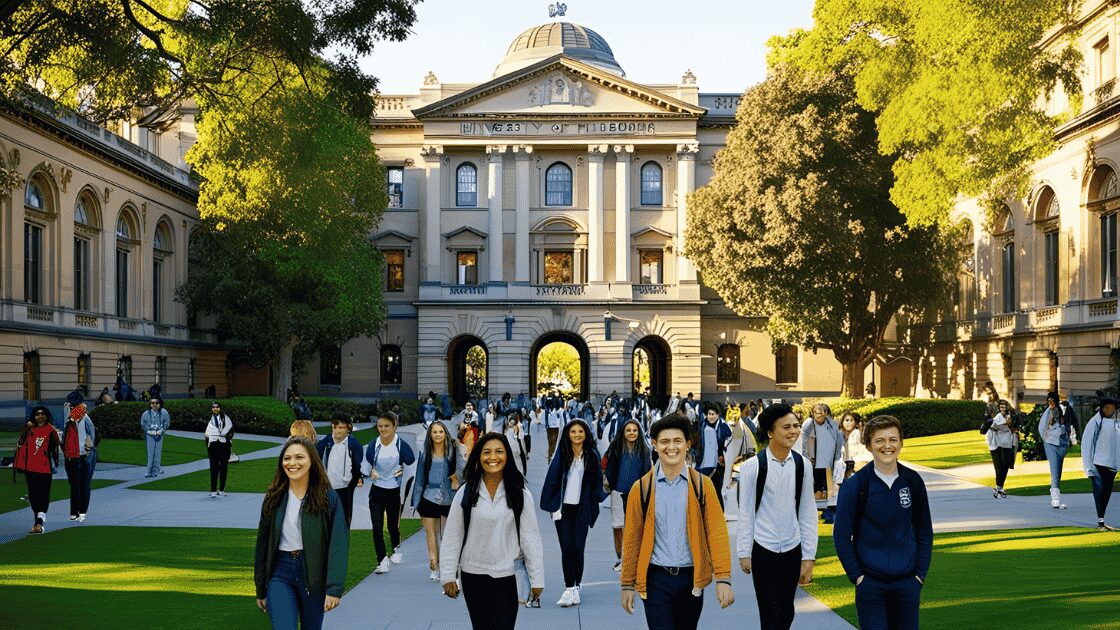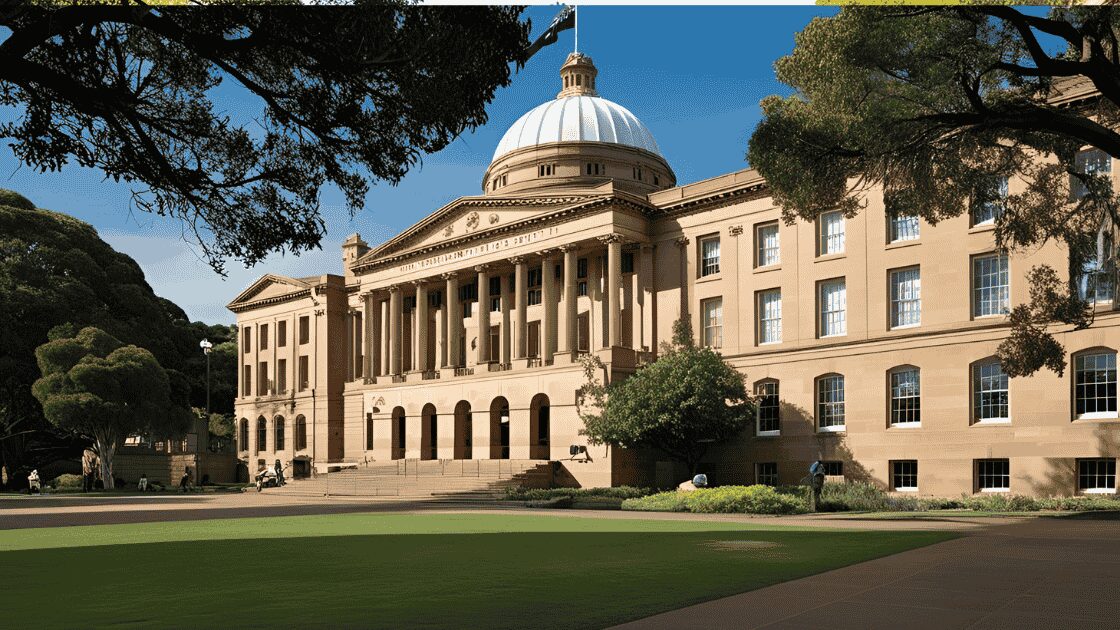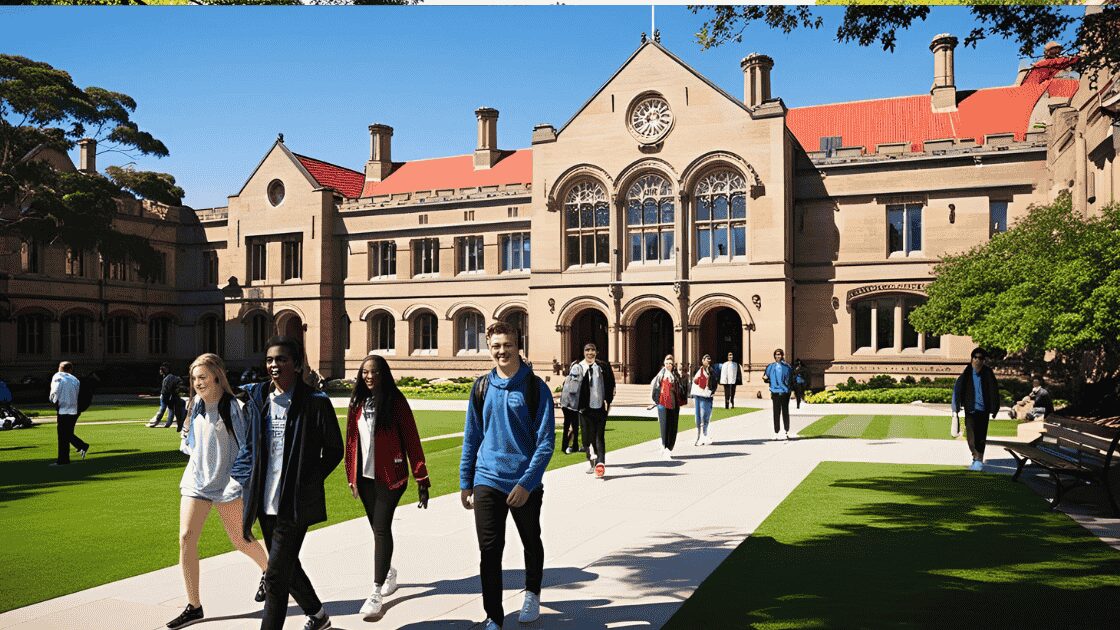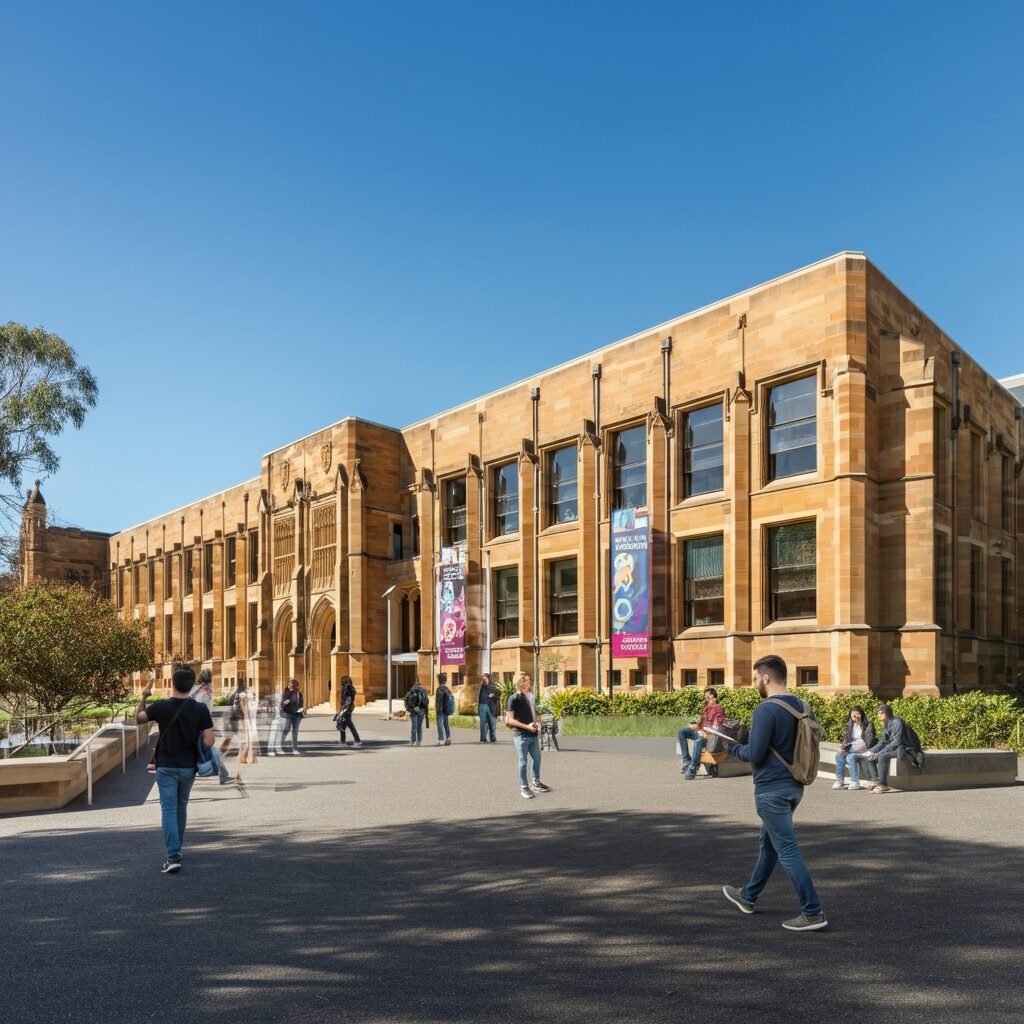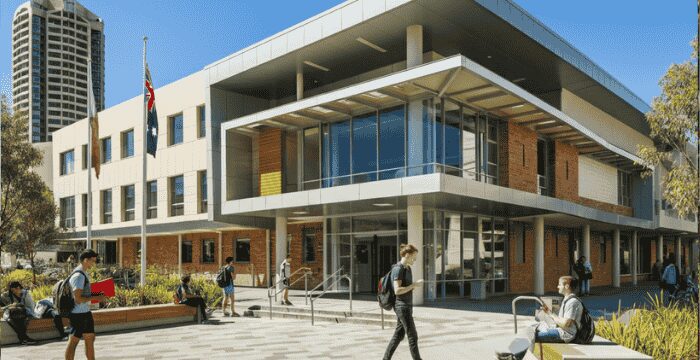Australia has become one of the top countries where foreign students can pursue superior degrees in computer science. An MS in Computer Science in Australia offers world-class education, cutting-edge research opportunities, and exceptional career prospects. With the world’s ranked universities and a prosperous tech industry, Australia is perfect for students who strive to pursue their careers in tech. This comprehensive guide explores everything you need to know about pursuing an MS in Computer Science in Australia, from the latest trends and top universities to costs, eligibility requirements, and potential salaries.
Latest Trends in MS in Computer Science in Australia (2025)
Australian Universities’ Rankings and Demand in 2025
Australian universities are at the forefront as far as ranking for excellent computer science programs goes. The University of Melbourne is at the head of the ratings of computer science education in Australia in 2025, and Monash University and the University of Sydney are close behind. Presenting the latest QS World University Rankings, six Australian universities have made it to the top 100 for computer science programs around the world.
Computer science professionals’ demand in Australia is increasing at a rate unprecedented so far. According to an industry report, by the year 2026, Australia will require a shortfall of about 20% more IT specialists to meet industry needs. This growth is underpinned by the increasing tech ecosystem of Australia, with Sydney and Melbourne emerging as major hubs of technology in Asia-Pacific.
Students pursuing an MS in Computer Science in Australia benefit from this growing demand, as universities continuously update their curricula to align with industry needs. Today, programs encourage experiences in practical skills on groundbreaking technologies such as artificial intelligence, machine learning and cybersecurity.
Latest Tuition Fees and Starting Salaries Of MS in Computer Science in Australia 2025
The investment in an MS in Computer Science in Australia typically ranges between AUD 25,000–40,000 per year for international students. As a major financial investment, it becomes a substantial return on investment.
Graduates with an MS in Computer Science in Australia enjoy competitive starting salaries ranging from AUD 85,000–140,000 annually, depending on their specialisation and job role. This makes computer science graduates part of the best-paid professionals in Australia’s job market.
Well-known employers such as Canva, Atlassian, Amazon, Google and Microsoft all actively target graduates from Australian Universities, which, among others, provide competitive salaries and superior benefits, as well as opportunities to advance a successful career.
Intake Periods
Australian universities typically offer two primary intake periods for MS in Computer Science in Australia programs
February/March Intake: This is the primary period of intake,, matching up with the start of the Australian academic year.
July/August Intake: This mid-term intake saves foreign students from the rigid demands.
Most universities have application deadlines, three to six months before the beginning of the semesters for the 2025 admissions. Advances should be made early, and the case is critical for students when applying for scholarships or other financial aid.
Top Universities in Australia for MS in Computer Science in 2025
Australia has a number of top universities that offer very good MS in Computer Science programs. The institutions are as follows, and their detailed look;
University of Melbourne
- QS Computer Science: #32
- Program Duration: 2 years
- Research Strengths: Artificial Intelligence, Human-Computer Interaction
- Industry Partnerships: IBM, Microsoft, Oracle
- Tuition Fees: Approximately AUD 60,884 per year
- Notable Features: High on research and innovation; specialised tracks in AI, cyber-security and distributed computing.
Australian National University (ANU)
- QS world Ranking-Computer Science: #40
- Program Duration: 2 years
- Research Strengths: MLG, Systems Engineering, Computer Vision
- Industry Partnerships: The Defence Science and Technology Group, CSIRO
- Tuition Fees: Around AUD 53,760 per year
- Notable Features: Based in Canberra in close proximity to the government research organisations, with a good, strong theoretical foundation.
University of Sydney
- QS World Ranking for Computer Science – 17. #42
- Program Duration: 1.5-2 years
- Research Strengths: AI, Robotics, Cybersecurity
- Industry Partnerships: Commonwealth Bank, Telstra
- Tuition Fees: Approximately INR 27–28.3 lakh annually
- Notable Features: Flexible program structure and several specialisations; close alliance with the industry.
UNSW Sydney
- QS World Ranking: Computer Science. #43
- Program Duration: 2 years
- Research Strengths: Quantum Computing / Big Data/ Software Engineering
- Industry Partnerships: Data61, Google
- Tuition Fees: Average AUD 62,300 per year
- Notable Features: Host to world-famous research centres; focus on practical and hands-on learning.
Monash University
- QS World Ranking for Computer Sciences: #55
- Program Duration: 2 years
- Research Strengths: Data Science, Cybersecurity
- Industry Partnerships: Bosch, Siemens
- Tuition Fees: Approximately AUD 54,000 per year
- Notable Features: Singular attention to industry-oriented skills; multiple campuses in Malaysia.
University of Queensland
- QS World Ranking For Computer Science. #65
- Program Duration: 1.5-2 years
- Research Strengths: Data Mining, Information Systems
- Industry Partnerships: Boeing, Rio Tinto
- Tuition Fees: Around AUD 50,000 per year
- Notable Features: Superb research facilities, well-balanced theoretical and practical orientation.
Latest Comparison Table of Top Universities in Australia 2025
| University | Global Rank | Tuition Fees (AUD) | Program Duration | Specializations Offered | Research Strengths |
| University of Melbourne | #32 | 60,884 | 2 years | AI, Cybersecurity, Distributed Computing | Human-Computer Interaction, AI |
| ANU | #40 | 53,760 | 2 years | Machine Learning, Computer Vision | Systems Engineering, Machine Learning |
| University of Sydney | #42 | 27–28.3 lakh INR | 1.5-2 years | Robotics, Cybersecurity, AI | AI, Robotics |
| UNSW Sydney | #43 | 62,300 | 2 years | Big Data, Quantum Computing, Software Engineering | Quantum Computing, Big Data |
| Monash University | #55 | 54,000 | 2 years | Data Science, Cybersecurity | Data Science, Cybersecurity |
| University of Queensland | #65 | 50,000 | 1.5-2 years | Data Mining, Information Systems | Data Mining, Information Systems |
This table provides a comprehensive comparison of the top universities offering MS in Computer Science in Australia, helping prospective students make informed decisions based on their preferences and priorities.
MS in Computer Science in Australia Eligibility Requirements 2025
Academic Requirements
To qualify for an MS in Computer Science in Australia, applicants must meet several academic criteria:
- Bachelor’s Degree: A completed Bachelor’s degree in a related computer science, information technology, must be in place. Some universities will accept students from outside their fraternity if they have the prerequisite subjects.
- Academic Performance: Universities demand a minimum GPA of 5.0, which is a scale of 7 (scores approximating 65-70% in the Indian grading system). While competitive programs in outstanding universities may call for better GPAS.
- Prerequisite Knowledge: Applicants must have a strong background in the basic computer science subjects, thus;
- Programming (Java, Python, C++)
- Data Structures and Algorithms
- Computer Architecture
- Database Systems
- Mathematics, Discrete Mathematics, Linear algebr,a Calculus
- Statistics
- Work Experience: Not always compulsory, relevant work experience might enhance an application, particularly for those programs which have a professional orientation.
There are universities that run bridging courses for students who might not meet the prerequisite requirements, but who demonstrate potential.
English Language Proficiency
As English is the medium of instruction for all MS in Computer Science in Australia programs, international students are required to demonstrate English proficiency through one of the following standardised tests:
- IELTS (Academic): Band score overall of 6.5 with each band no lower than 6.0. Scores of 7.0 or more may be needed for entry at more prestigious universities.
- TOEFL ibt: Minimum 79-80 with a minimum of 20-22 in each section.
- PTE Academic: Minimum score of 58-65, there was no communicative skill of less than 50.
- Cambridge English Advanced (CAE): Minimum score of 176-185.
Exemption to English language requirements can be awarded to students who have:
- Studied the whole of my undergraduate in English.
- Seen in an English-speaking country in a long time.
- Do nationals of countries whose first language is English?
One must note that English language requirements can be ever so slightly different for different universities, and applicants must ensure to find out what requirements they have to meet regarding the specific university of application.
MS in Computer Science in Australia Cost in 2025
Tuition Fees
The cost of pursuing an MS in Computer Science in Australia varies across universities and depends on factors such as program duration, university reputation, and location. Here’s the breakdown of major universities’ tuition fees:
- University of Melbourne: AU$ 60,884 per annum (Approx INR 33.5 lakh)
- Australian National University: AU$ 53,760 yearly (approximately INR 29.6 lakh)
- University of Sydney: AUD 50,500 annually (about INR 27.8 lakh)
- UNSW Sydney: AUD62,300 per annum (about INR 34.3 lakh)
- Monash University: AUD$ 54,000 per year ( INR 29.7 lakh )
- University of Queensland: AUD 50,000 per annum (about INR 27.5 lakh)
- RMIT University: AUD 34,560 yearly (approx INR 19 lakh)
- University of Adelaide: AUD 46,000 every year (about INR 25.3 lakh)
Most MS in Computer Science in Australia programs are two years in duration, so students should budget for two years of tuition fees. There are, however, universities that provide accelerated 1.5-year programs.
Other academic expenses are:
- Application fees: AUD 50-100
- Student services and amenities fees: AUD 200-300 per year
- Course materials and textbooks: AUD 500-1,000 per year
- Technology requirements (laptop, software): AUD 1,000-2,000
Living Expenses
The cost of living while studying an MS in Computer Science in Australia varies significantly depending on the city and lifestyle choices. Here’s a monthly breakdown:
Accommodation:
- On-campus accommodation: AUD 400-800 per month
- Shared off-campus accommodation: AUD 300-500 per month
- Private rental: AUD 600-1,200 per month
- Food and Groceries:
- Basic groceries: AUD 300-400 per month
- Occasional dining out: AUD 100-200 per month
Transportation:
Public transport: AUD 100-150 p.m (student concessions available)
Bicycle purchase (one-time): AUD 100-300
Utilities and Internet:
Electricity, Gas, Water:
AUD 150 – 200 per month (if not paid for in rent)
Internet: AUD 60-100 per month
Health Insurance:
Overseas Student Health Cover (OSHC): AUD 500-700 per year (mandatory)
Personal Expenses:
- Phone plan: AUD 20-40 per month
- Entertainment and social activities: AUD 100-200 per month
- Miscellaneous expenses: AUD 100-150 per month
The Australian government estimates that international students require about AUD 21,041 a year (AUD 1,753 a month) for living costs. But cities such as Sydney and Melbourne are usually costly than other places.
Part-Time Work Opportunities
International students pursuing an MS in Computer Science in Australia can work up to 48 hours per fortnight during semesters and unlimited hours during scheduled breaks. This is an opportunity to pay some living costs whilst obtaining work experience.
Traditional part-time work for computer science students consists of:
- IT support roles: AUD 25-35 per hour
- Programming or development internships: AUD 25-40 per hour
- Research assistantships: AUD 30-40 per hour
- Tutoring: AUD 30-50 per hour
- Retail or hospitality: AUD 20-25 per hour
Several universities also provide on-campus employment opportunities that are designed only for international students. These jobs often allow for flexibility regarding class schedules, as well as excellent networking benefits.
MS in Computer Science Salary in Australia 2025
Average Salaries by Role
Graduates with an MS in Computer Science in Australia can expect competitive salaries across various roles in the tech industry. A breakdown of average annual salaries by role can be seen below:
Software Engineer/Developer:
- Entry-level (0-2 years): AUD 85,000-95,000
- Mid-level (3-5 years): AUD 100,000-120,000
- Senior (5+ years): AUD 120,000-150,000+
Data Scientist:
- Entry-level: AUD 90,000-110,000
- Mid-level: AUD 110,000-130,000
- Senior: AUD 130,000-160,000+
Machine Learning Engineer:
- Entry-level: AUD 95,000-115,000
- Mid-level: AUD 115,000-140,000
- Senior: AUD 140,000-180,000+
Cybersecurity Specialist:
- Entry-level: AUD 85,000-105,000
- Mid-level: AUD 105,000-130,000
- Senior: AUD 130,000-170,000+
DevOps Engineer:
- Entry-level: AUD 90,000-110,000
- Mid-level: AUD 110,000-135,000
- Senior: AUD 135,000-160,000+
Cloud Solutions Architect:
- Entry-level: AUD 100,000-120,000
- Mid-level: AUD 120,000-150,000
- Senior: AUD 150,000-200,000+
UX/UI Designer (with technical background):
- Entry-level: AUD 80,000-95,000
- Mid-level: AUD 95,000-120,000
- Senior: AUD 120,000-150,000+
IT Project Manager:
- Entry-level: AUD 90,000-110,000
- Mid-level: AUD 110,000-140,000
- Senior: AUD 140,000-180,000+
Generally, salaries will be higher in major cities such as Sydney or Melbourne than in small cities or the countryside. But you will also pay a high cost of living in the metropolitan areas.
Top Employers for MS in Computer Science Graduates in Australia 2025
Australia has a thriving tech ecosystem with numerous companies actively hiring graduates with an MS in Computer Science in Australia. Top employers include:
Tech Giants:
- Google (Sydney office)
- Microsoft (Sydney and Melbourne offices)
- Amazon Web Services
- IBM
- Oracle
- SAP
Australian Tech Companies:
- Atlassian (the developer of Jira and Confluence)
- Canva
- WiseTech Global
- Aconex
- REA Group
- SEEK
Financial Institutions:
- Commonwealth Bank
- ANZ
- Westpac
- National Australia Bank
- Macquarie Group
Consulting Firms:
- Accenture
- Deloitte Digital
- PwC Digital
- KPMG Digital
- EY Technology Consulting
Government and Research:
- CSIRO’s Data61
- Defence Science and Technology Group
- Australian Government Departments
- State Government IT Departments
Startups and Scale-ups:
- Australia’s startup environment is fast emerging, most notably in Sydney and Melbourn,e creating great opportunities for MS graduates.
Latest Career Opportunities After Pursuing an MS in Computer Science in Australia 2025
An MS in Computer Science in Australia provides excellent career growth opportunities. These are some of the career paths as follows:
Technical Career Path:
Junior Developer → Senior Developer → Technical Lead → Solution Architect → Chief Technology Officer (CTO)
Management Career Path:
Developer → Team Lead → Project Manager → Program Manager → IT Director
Research Career Path:
Research Assistant → Research Scientist → Senior Researcher → Director of Research.
Entrepreneurial Path:
Many of the MS graduates end up starting tech startups themselves, taking advantage of the supportive startup environment of Australia
Academic Career:
Some of the graduates go on to do PhDs and pursue academic careers in Australian universities
Australia’s skilled migration program also provides a route to permanent residence for international students with a demand in their skills, such as computer science. With a Post-Study Work visa, graduates are able to work in Australia for 2-4 years after their studies, which will give them working experience, as well as a pathway to permanent residence.
Latest Program Structure and Specialisations for MS in Computer Science Australia 2025
Common Program Structure
An MS in Computer Science in Australia typically follows a structured approach to ensure students develop both breadth and depth of knowledge. 99% of programs need to complete 120-160 credit points, or 12-16 subjects in total, for the degree.
Typical Program Duration:
- Full-time: 1.5-2 years
- Part-time: 3-4 years (only for international students, rarely requiring)
Course Structure:
- Core subjects: 4-6 topics that will teach fundamental advanced computer science topics
- Specialisation subjects: 4- 6 subjects in the specialised area identified.
- Electives: 2 – 4 subjects which may be selected from associated subjects.
- Research component: A research project or thesis is part of many programs (24-48 credit points).
Assessment Methods:
- Written examinations
- Programming assignments and practical projects
- Research papers and literature reviews
- Group projects and presentations
- Capstone projects or thesis
Teaching Methods:
- Lectures and tutorials
- Laboratory sessions
- Workshops and seminars
- Industry guest lectures
- Online learning components
Popular Specialisations for MS in Computer Science Australia 2025
Students pursuing an MS in Computer Science in Australia can choose from various specialisations to align their studies with career goals:
Artificial Intelligence and Machine Learning:
- Focus areas: Neural network, deep learning, natural language processing, and computer vision
- Key subjects: Machine Learning Algorithms, Deep Learning, Reinforcement Learning AI Ethics
- Career outcomes: AI Engineer, Machine Learning Engineer, AI Researcher
Data Science and Analytics:
- Focus areas: The set of technologies of big data, predictive analytics, and data visualisation
- Key subjects: Statistical Learning, Data Mining, Big Data Processing, Data Highlighting
- Career outcomes: Data Scientist, Data Engineer, Business Intelligence Analyst
Cybersecurity:
- Focus areas: Network protection, Cryptography, Digital forensics, Governance of security
- Key subjects: Cryptography, Network security, Ethical hacking, Security governance
- Career outcomes: Penetration Tester, Security Analyst, Security Consultant.
Cloud Computing:
- Focus areas: Cloud architecture, virtualisation, distributed systems
- Key subjects: Cloud Services, Distributed Systems, Virtualisation Technologies
- Career outcomes: Cloud Architect, Cloud Engineer, DevOps Engineer
Software Engineering:
- Focus areas: Recent software development approaches, product quality assurance
- Key subjects: Advanced Software Design, Software Testing, Agile Methodologies
- Career outcomes: Software Engineer, QA Engineer, DevOps Engineer
Human-Computer Interaction:
- Focus areas: The user experience design, the usability testing, and the interface design
- Key subjects: UX Design, ID, UXE
- Career outcomes: UX Designer, UI Developer and Interaction Designer
Robotics and Autonomous Systems:
- Focus areas: There are robotic systems, computer vision, and sensor fusion environments.
- Key subjects: Robotics, Computer Vision, Sensor Technologies
- Career outcomes: Robotics Engineer, Automation Engineer
Latest Research Opportunities After MS in Computer Science in Australia 2025
Many universities offering an MS in Computer Science in Australia emphasise research components, providing students with opportunities to contribute to cutting-edge developments in the field:
Research Projects:
- The major part of most programs is a significant research project or thesis (usually in the last semester).
- Students are supervised by the academic staff as they work on new research questions.
- Projects usually follow the university’s research strengths, with publishing as a result.
Research Centres:
- UNSW’s Artificial Intelligence Institute
- The Centre for AI and Digital Ethics of the University of Melbourne
- ANU’s Computational Learning Systems Laboratory
- Monash University’s Centre for Data Science
Industry Collaborations:
- Most universities have collaborated with industry for research purposes.
- Students might have chances to develop industry-sponsored projects
- Such partnerships usually create job opportunities after graduation.
Research Pathways:
- Excellent research part results may provide avenues in the way of PhD degrees
- Most universities have combined Master’s and PhD programs for brilliant students.
Application Process and Deadlines for MS in Computer Science in Australia 2025
Applicants to Master’s programme in Computer Science in Australia should make plans and uphold deadlines. In three main intakes, Australia offers for the 2025 academic year. taking place in February (primary intake), July (secondary intake) and November. In February 2025, applications usually open in August 2024 and close somewhere in October and November 2024. Most of the July 2025 intake applications are opened in February and close around late March – early April 2025.
Application Process
The general steps of application include several critical ones.
- Research and Shortlisting: Research about 8-10 universities that offer MS in Computer Science programmes and narrow your search to bring it down to 5-6, then based on the following, such as fees, career advantages, and academic reputation.
- Document Preparation: Gather all required documents, including:
- Academic transcripts (with minimum C. G. P. A 7.0, or G. P. A 3.5)
- Completed application form
- GRE scores (if asked by the University)
- English language proficiency test results, IELTS, TOEFL or PTE.
- 2-3 Letters of Recommendation
- Statement of Purpose
- Updated CV
- Passport and photographs
- Online Application Submission: The Majority of Australian universities expect you to make an online application through their portals or through centralised application portals.
- Application Review: Processing applications in universities normally takes 4 to 6 weeks. You can be summoned for an interview or requested to provide other documents.
- Offer Acceptance: If approved, you will be sent either a conditional or unconditional offer letter. Conditional offers are offers stating things you should do before being accepted completely.
- Visa Application: Having accepted your offer, remitted the deposit and applied, you will need to apply for a student visa (subclass 500), which will require:
- Confirmation of Enrollment (CoE)
- Overseas Student Health Cover (OSHC)
- Proof of financial capacity
- Visa fees (approximately AUD 620)
Key Deadlines for 2025
For the February 2025 Intake:
- Application period: August-November 2024
- Deadline at most universities: October-November 2024
- Semester starts: February/March 2025
For the July 2025 Intake:
- Application period: February-March 2025
- Deadline at most universities: April-May 2025
- Semester starts: Late June/Early July 2025
It should be noted, however, that from 2025, some programmes, such as the Master of Computer Science at the University of Melbourne, will only have a single intake in February, stopping their mid-year intake option. University of Queensland intake deadline for Semester 2 2025, July intake — May 5, 2025. Offer acceptance by May 18, 2025.
It is highly advisable to begin the application process very early in time because visa processing times differ, and early application increases better chances of acceptance, especially for the competitive programmes.
Conclusion
Pursuing an MS in Computer Science in Australia is a transformative step for students aspiring to excel in the tech industry. Ranked among the world’s best universities, Australia is also a country with avant-garde research and a prospering job environment where a student’s career can develop. The program prepares students with advanced technical skills, industry-applicable knowledge and learning from the best employers such as Google, Microsoft, and Canva. In addition, opportunities for permanent residency and attractive wages position Australia as the number one country for international students.
If you’re considering an MS in Computer Science in Australia, take the time to evaluate factors such as tuition fees, living expenses, eligibility requirements, and career goals. With adequate planning and preparation, you will maximise this opportunity and earn a successful technology career path.
FAQs (Frequently Asked Questions)
Q1. What is the cost of an MS in Computer Science in Australia?
Tuition fees for an MS in Computer Science in Australia typically range between AUD 25,000–40,000 annually. The precise cost varies with the university and length of the program.
Q2. Which university is best for an MS in Computer Science in Australia?
The University of Melbourne is usually regarded as the best for computer science because of its strong global ranking, research excellence and industry cooperation. The other top universities include ANU, UNSW Sydney and the University of Sydney.
Q3. What is the average salary after completing an MS in Computer Science in Australia?
Graduates receive competitive compensation between AUD 85,000 and AUD 140,000 a year, depending on specialisation and duty. The likes of Data Scientist or Machine Learning Engineer roles tend to attract significantly higher pay.
Q4. Is it possible to work while studying my MS in Computer Science?
Yes! During semesters, international students can work for 48 hours in each fortnight but there is no maximum limit to the working hours during semester breaks. This enables students to compensate for living costs with work experience.
Q5. What are the job prospects after completing an MS in Computer Science in Australia?
Job opportunities are exceptional, and after graduation, graduates will be hired by top companies such as Google, Microsoft, Atlassian, Canva, and Amazon. Staff favourites are Software Engineer, Data Scientist, Cybersecurity Specialist, and Machine Learning Engineer.



